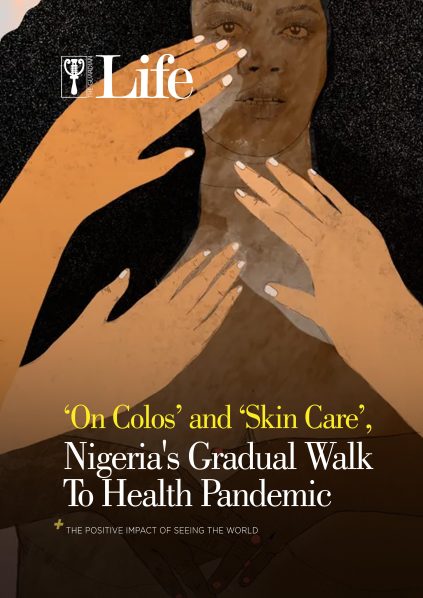
The Nigerian social media space, especially TikTok, is currently filled with soundbits from disk jockeys (DJs) or snipets from musicians. This has formed the current trend of social media challenges. Very noticeable among netizens is the ability to ‘cruise’ around things, which usually downplays the effects of a particular issue.
[ad]
One of the current trends on social media is ‘On Colos’, which is accompanied by videos of young boys and sometimes girls reacting aggressively to the effects of drug abuse. If the recent videos are anything to go by, Nigeria is gradually threading the path of another pandemic in its health system.
Similarly, there are numerous videos of individuals mixing different chemicals together to create organic creams for skin care.
For individuals who have no knowledge of chemicals and cannot remember the first 20 elements, young Nigerians buying their organic creams show a state of emergency should be declared in the health sector.
In the last few years, words have lost their meaning. Skin care is the use of cosmetics to take care of your skin. It could also mean a routine or something that you apply to keep your skin healthy and attractive. However, the abuse of the term has led to individuals subscribing to these to have a ‘glowing’ skin. This has led to a prevalence of individuals bleaching their skin.
According to a study by the World Health Organization (WHO), 77 per cent of Nigerian women use bleaching creams, a figure that calls for urgent intervention.
Drug abuse and skin bleaching are two different things, but they are closely related as regards the Nigerian health care system.
For drug abuse, a 2021 report by the Nigeria Drug Law Enforcement Agency (NDLEA) revealed that over 40 per cent of Nigerian youth between the ages of 18 and 35 were deeply involved in drug abuse.
There’s a tendency that the number could have increased owing to the prevalence of substance abuse. In times past, canabis, crack, tramadol, codeine, rhypnol, aphrodisiacs, cocaine and painkillers were abused.
The current trend is laughing gas, which involves filling balloons with nitrous oxide and then inhaling it to create a rapid rush of euphoria and feel ‘fly.’ This is common in house parties in major cities such as, Lagos and Abuja; with the rural and densely populated areas involved in using the earlier listed ones.
Drug Abuse is a global issue, which has led to call to take proactive steps and intensify efforts to curb the menace. According to the United Nations Office on Drugs and Crime (UNODC), the 2022 World Drug Report shows that about 284 million people, ages 15 to 64, used drug in 2020, a 26 per cent increase from the last decade.
This figure is on the high side in Nigeria with the country having a higher drug reliance percentage more than the global average. The figure is worrisome as there are now reports of children in secondary schools across the country involved in the use of drugs.
There are several reasons why youth engage in substance or drug abuse. One of the most obvious reasons is peer pressure, which has led many youth down the path of addiction from the first time they tried drugs. Another reason is to engage in sexual activities.
Nigeria’s health sector is currently not in its best shape. Nigeria currently ranks among the lowest in terms of health care access in the world. The nature of healthcare has led individuals to seek alternatives abroad, in what is known as “medical tourism.”
According to the Federal Government, Nigerians spend between $1.2 million and $1.6 million yearly on medical tourism.
I spoke with four medical doctors, Doctors Edidiong Odung, Nzubechukwu Okeke, Chinonye Ogbonnaya, and Bassey Bassey Asuquo, to understand the effects of drug abuse and skin bleaching on Nigerians and the health system.
Skin bleaching is prevalent among youths wanting to change their skin color; this is based on the assumption that fair people are beautiful and easily attract the opposite gender.
With this, a lot of harmful chemicals are applied to the skin.
Edidiong noted that there are certain conditions like vitiligo that could lead to someone considering bleaching, and this is usually done in consultation with a certified dermatologist.
Nzubechukwu corroborated this and noted that it’s usually the last resort for vitiligo, and it’s done under proper guidance in line with medical practices.
Skin bleaching comes with certain effects in the short and long term, according to the doctors.
The short-term effects include skin irritation, uneven skin tone, and an increased disposition to sunburn. In the long term, kidney damage, a reduction in skin elasticity that makes suturing the skin difficult for the doctor, a delay in wound healing, skin infection, and premature aging.
For Ogbonnaya, the effects of skin bleaching are irreversible due to the harsh chemicals used that damage the melanin.
To better understand how substances work in the body, Asuquo revealed that the brain produces hormones that react to events when we are happy or sad, and this makes us human.
However, using drugs alters that cycle. “When your body cells get overstretched with excitement, they arrive at a point where they constantly want to stay there. When you are not using the substance, your body feels like this one I’m doing now that I used to do is not sufficient. So, when events happen that you’re supposed to be excited about, you’re excited, but you feel it’s not enough. So, you’re pushed to inject things to get to the level where you feel excited.”
Drug abuse is common in different parts of the country. Edidiong argued that there’s a place for advocacy, and beyond the popular belief of peer pressure, there could be a case of status symbolism for young individuals who model their lives after their favourite celebrity and want to be like them.
To better understand the effects, Nzubechukwu noted that it’s now a social problem and medical personnel will always be at the receiving end. “Doctors are not there when the addiction kicks off, but when the problems that follow the addiction kick off, they end up in our hands because we have to step in,” she concluded.
Beyond the problems, there are solutions, which in Nigeria’s case are slim. Asuquo noted that there are silver linings in combating drug abuse. There are rehabilitation centers spread across the country, but they are not publicised enough, and much should be done in that aspect.
The medical sector is one of the worst hit by the brain drain and ‘Japa’ wavebedevilling the country. There has been a mass exodus of healthcare professionals like doctors, nurses, and pharmacists from the country.
According to WHO recommendations, there should be a doctor-patient ratio of 1:600, but the Nigerian figure varies based on population.
It varies from 1:5000 to 1:30000 and could rise as high as 1:30000 in densely populated areas or rural areas. This also adds to the worries about who will be available when the effects of drug abuse and skin bleaching arise.
One cannot but look at the impact of social media, and celebrities on the spread of drug abuse.
For the former, rather than use it as a tool to spread advocacy against the use of drugs, it has become a tool to spread it. There are influencers on different social media platforms promoting the use of drugs.
For the latter, celebrities who are seen as rol models are often pictured taking one form or drug or the other. In a country where access to social media is easy for underage children, such sight only helps push the use of drugs.
Furthermore, the lyrics of some of the music we listen to is questionable. One of such is Sometime – T. I Blaze “Sometimes food no dey give man joy but Canadian loud the feeling is different” this lyrics suggests that Canadian loud which is “an expensive synthetic Canabis from Canada” is a better substitution for food. Also, Burna Boy’s – Last Last, “I need Igbo and Shayo” suggests that while going through a heartbreak, you can rely on drugs and booze to get through it. However, these lyrics are more of a reflection of the society and only mirrors what is mostly done.
To address this, the National Orientation Agency has to be deliberate and contribute to the fight against drug abuse. Anti-substance songs should be promoted to serve as a reminder ans admonish young ones on the dangers of drug abuse.
One of such songs is a 2014 freestyle by Patoranking and Olamide – Bora, a song which sampled Chris Brown’s – Loyal, the song talks about the dangers of skin bleaching and the need for people to embrace whatever color of skin they have.
Advocacy will always be an effective way to curtail both menaces. The NDLEA has to intensify its efforts while working alongside other government agencies to lead the campaign against drug abuse and skin bleaching.
Skin Bleaching and Drug Abuse falls within the ambit of the National Agency for Food Drugs Administration and Control (NAFDAC).
The agency has to conduct pepper investigations on the influx of drugs in the Nigerian market and how some drugs which should be use for specific purposes are easily accessible.
Also, create adequate measures to look at how cosmetic products are prepared in the country and impose appropriate punishment on individuals found wanting.
[ad unit=2]








